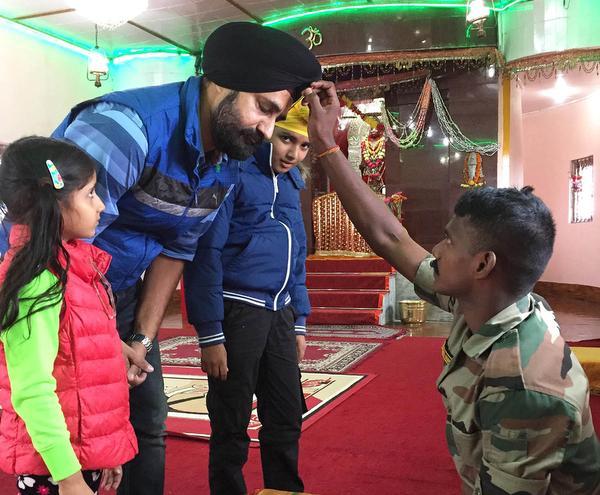
It is not peak season in October, but scores of visitors are reaching the temple that touches the clouds in Gangtok.
Hanuman Tok is a destination for visitors of all faiths, many of whom also come to take in the 360-degree view of the Himalayas. They are received at the temple by multi-faith ‘priests’ in army uniform displaying a ‘duty above faith’ philosophy.
At 7,200 feet, the temple with a northeastern architectural flavour on the city’s outskirts offers panoramic views of Kanchenjunga, the third highest mountain in the world and other peaks.
Christian ‘priest’
Sajin Kumar of Nagercoil, attached to the army’s ‘Black Cat’ 17th Mountain Division, and a Christian, was on duty a few days ago, greeting visitors with tilak and distributing sweets in the sanctum santorum.
“This temple is maintained by the Indian Army. In an earlier deployment, there was a Muslim soldier who did this work. We are on duty here. After all, nationalism is above religion,” Mr. Kumar said.
Uniformed personnel of the Indian Army greet those making the trek, guiding them around the temple and giving holy water and other offerings. Hanuman Tok has been with the army for decades, and houses a red idol of the deity which was installed, an inscription explains, after “an Indian Political Officer, Appaji Pant, had a divine dream.”
Sanjeevani legend
During peak season, about a thousand tourists visit.
The temple’s legend is carved in golden text into the black stone display. It says Lord Hanuman rested at the spot while taking the Sanjeevani life-saving herb from the Himalayas to Lanka, to save Lord Rama’s brother Lakshmana. Before the temple came up on in the 1950s, local people worshipped a stone idol.
Global attraction
“The scenic beauty of the hill temple attracts people from all over the world.
It is part of the itinerary of tour operators and a lot of people from other religions visit.
The Kanchenjunga is visible when the sky is clear. People from other faiths do not hesitate to take the holy water and offerings,” Mr. Kumar said.
Sikkim has a heavy presence of troops, although this does not come in the way of tourists moving to areas with scenic attractions.
The international border covers China in the North, Nepal in the West and Bhutan in the East.
[Source:-The Hindu]



